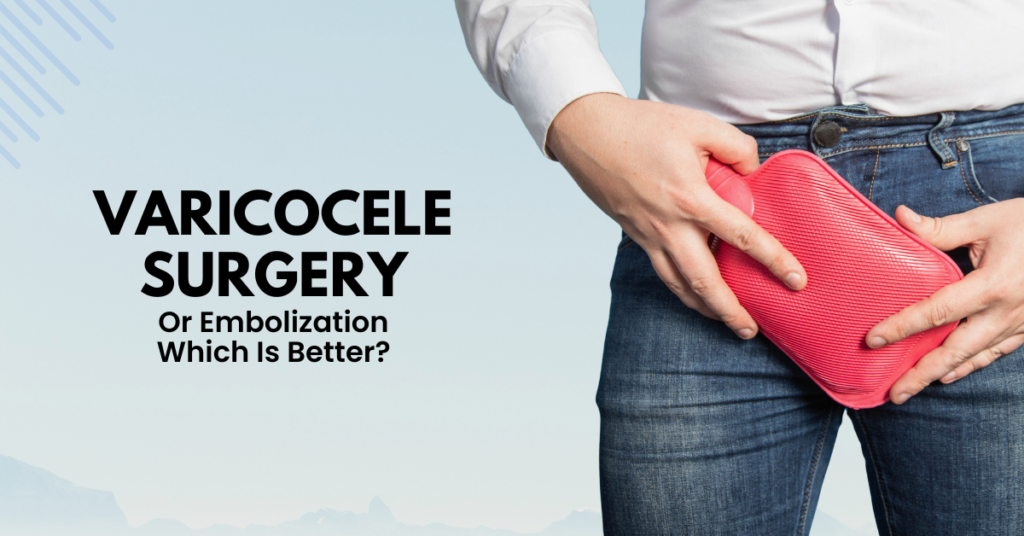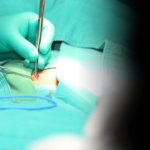
If you or someone you know has been diagnosed with a varicocele, you might be wondering about the best treatment options. This blog will take a detailed look at two common treatments: varicocele surgery and embolization. We’ll break down what each procedure involves, the pros and cons of each, and help you decide which might be better for you.
1. What is a Varicocele?
A varicocele is like having varicose veins, but in the scrotum. It’s a swelling of the veins inside the scrotum, the loose bag of skin that holds your testicles. These veins are supposed to carry blood from your testicles back to your heart, but when they get swollen, they don’t work properly. This can lead to pain, swelling, and even fertility problems.
2. Why Treat a Varicocele?
Not everyone with a varicocele needs treatment. However, treatment is often recommended if you have:
- Pain or discomfort in the scrotum.
- Fertility problems (difficulty getting a partner pregnant).
- Shrinking of the affected testicle (testicular atrophy).
3. Treatment Options
There are two main ways to treat a varicocele: surgery and embolization. Let’s dive into each of these options.
4. Varicocele Surgery
What It Is:
Varicocele surgery, also known as varicocelectomy, involves tying off the affected veins to redirect blood flow to healthier veins. There are three main types of varicocele surgery:
- Open Surgery: The surgeon makes a small cut in the lower abdomen or groin to reach the affected veins.
- Laparoscopic Surgery: The surgeon makes small cuts in the abdomen and uses a tiny camera to guide the surgery.
- Microsurgical Varicocelectomy: The surgeon uses a microscope to make very precise cuts and tie off the veins. This method aims to minimize damage to surrounding tissues and reduce the risk of complications.
Pros of Surgery:
- High Success Rate: Surgery is often very effective at reducing pain and improving fertility.
- Permanent Solution: Once the veins are tied off, they won’t cause problems again.
- Improves Symptoms Quickly: Many people find relief from pain and swelling soon after surgery.
Cons of Surgery:
- Invasive Procedure: Surgery involves making cuts in the body, which can be more painful and require a longer recovery time.
- Risk of Complications: As with any surgery, there is a risk of infection, bleeding, and damage to surrounding tissues.
- Recovery Time: You might need to take time off work or school to recover. Full recovery can take a few weeks.
5. Varicocele Embolization
What It Is:
Varicocele embolization is a less invasive procedure that involves blocking the affected veins. Here’s how it works:
- A radiologist makes a small cut in the groin or neck.
- They insert a thin tube (catheter) into a vein and guide it to the varicocele.
- Using tiny coils or a special solution, they block the affected veins, stopping blood flow and reducing the varicocele.
Pros of Embolization:
- Less Invasive: There are no large cuts, just a tiny puncture. This means less pain and a quicker recovery.
- Quick Procedure: Embolization usually takes about an hour, and you can often go home the same day.
- Fewer Complications: There’s a lower risk of infection and other complications compared to surgery.
- Quick Recovery: Most people can return to normal activities within a few days.
Cons of Embolization:
- Less Effective for Large Varicoceles: Embolization may not be as effective for very large varicoceles.
- Risk of Recurrence: There’s a slightly higher chance that the varicocele could come back compared to surgery.
- Limited Availability: Not all medical centers offer embolization, so you might need to travel to find a specialist.
6. Deciding Which Is Better
Choosing between varicocele surgery and embolization depends on several factors:
- Severity of the Varicocele:
- If the varicocele is very large or causing severe symptoms, surgery might be the better option.
- Personal Preference:
- Some people prefer a less invasive procedure with a quicker recovery time, making embolization more appealing.
- Medical History:
- If you have other health issues or previous surgeries, one procedure might be safer or more suitable for you.
- Fertility Concerns:
- Both procedures can improve fertility, but the success rates and long-term outcomes can vary. Discussing this with your doctor can help guide your decision.
- Access to Specialists:
- Not all hospitals or clinics offer both options. Availability might influence your choice.
7. Talking to Your Doctor
It’s crucial to have an open conversation with your doctor about your options. Here are some questions you might want to ask:
- What are the risks and benefits of each procedure in my case?
- What is the recovery time for each procedure?
- How long will I need to take off work or school?
- What are the chances of the varicocele coming back after each procedure?
- How will each procedure affect my fertility?
8. After the Procedure
Regardless of which treatment you choose, here are some general tips for recovery:
- Follow Your Doctor’s Instructions: Whether you have surgery or embolization, it’s important to follow all post-procedure care instructions.
- Rest: Give your body time to heal. Avoid heavy lifting or strenuous activities for a few weeks.
- Manage Pain: Over-the-counter pain medications can help manage any discomfort. Your doctor might also prescribe stronger pain relievers if needed.
- Monitor for Complications: Keep an eye out for signs of infection or other complications, like severe pain, fever, or swelling. Contact your doctor if you notice anything unusual.
9. Success Rates and Long-Term Outcomes
Both varicocele surgery and embolization have high success rates, but the effectiveness can vary depending on individual circumstances. Here’s a quick comparison:
- Surgery: Studies show that surgery has a high success rate in reducing symptoms and improving fertility. Most men see improvements in pain and swelling, and about 50-70% of men experience improved sperm quality and increased fertility.
- Embolization: Embolization also has high success rates, with many men experiencing relief from symptoms. However, the recurrence rate is slightly higher than with surgery. Around 40-60% of men see improved fertility after embolization.
10. Choosing the Best Hospital for Varicocele Surgery in Mumbai
If you are considering varicocele surgery in Mumbai, it’s essential to choose a hospital with experienced surgeons and a strong track record of successful outcomes. At www.aapkacare.com, we offer the best varicocele surgery in Mumbai and best LASIK surgery in Mumbai. Our hospitals are equipped with state-of-the-art facilities, and our surgeons are highly skilled in performing both varicocele surgery and embolization, ensuring you receive the best possible care.
Conclusion
Choosing between varicocele surgery and embolization depends on various factors, including the severity of the varicocele, personal preferences, and medical history. Both treatments are effective and have their own advantages and disadvantages. It’s essential to discuss your options with your doctor, consider your circumstances, and make an informed decision that’s best for your health and well-being.
Remember, whether you choose surgery or embolization, the goal is to relieve pain, improve your quality of life, and address any fertility concerns. With the right treatment and proper care, you can successfully manage a varicocele and enjoy a healthier future. For the best varicocele surgery in Mumbai, visit www.aapkacare.com and learn more about how we can help you achieve optimal health.



